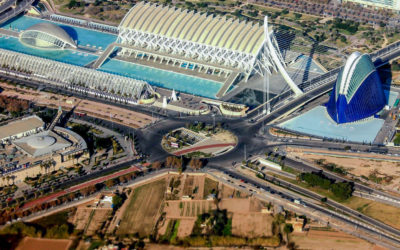CARTIF PROJECTS
MOVE2CCAM
MethOds and tools for comprehensive impact Assesment of the CCAM solutions for passengers and goods
Description
The project has as main objective to quantify the impact of the massive deployment of autonomous and connected mobility solutions in Europe through the development of a tool based in systems dynamic that will be build as of citizens and organizations perceptions collected in co-creation activities. Based in the results of the investifation realized, the consortium will define a series of recommendations to have into account on the design and deployment of mobility services with autonomous vehicles as well as on the development of urban mobility.
Objectives
- Definition of at least 200KPIs to be used in the system dynamics model to be developed in the project for the quantification of the impacts produced by the massive deployment of connected and autonomous vehicles, in different time horizons (2025, 2030 and 2050).
- Realization of 60 co-creation activities involving around 8500 citizens and 300 organisations from the automotive and ICT sectors, urban planning stakeholders and health experts, among others. These activities will be carried out online and in person in the regions identified regions in the project located in Spain. France, United Kingdom, Germany, Greece, Poland, Cyprus and the Netherlands just as Pan European level and will consist of a series of surveys, dialogies, workshops and games of virtual reality.
- Co-design of at least 30 use cases and scenarios with connected and autonomous vehicles as result of the identification of mobility and transport needs that require the different citizens and companies profiles.
- Co-design of 15 businees models to deploy with connected and autonomous vehicles after the aplication of work dynamics in the co-creation activities.
- Recopilation of perceptions that citizens and organizations have about the autonomous and connected vehicle in terms of risks and advantages as well as confidence degree by a continuous intercation in co-creation activities.
Actions
- To identify and define the propperly KPIs for the development of the systems dynamic model that helps to identify the effects and impacts of a massive deployment of connected and autonomous vehicles at the environment, economy, health, mobility, safety, transport network efficiency, the soil of use and equity.
- Estimation of impacts of the massive deployment of autonomous vehicles in the regions of the project applying an approach of environmental and social life cycle analysis.
- Organization of activities of co-creation with organizations that belogn to the automobil and ICT sector, agents implied in urban planification and health experts and citizens of different profiles that allows collect perceptions about the autonomous vehicle from different points of view.
- Organization of workshops in Spain where project results will be sawn (e.g. proposed mobility services, business models, expected impacts) to organizations and citizens.
- Definition of recommendations to be considered at the design of urban mobility pland and roadmaps of autonomous and connected vehicles.
Expected results
- Impacts assesment framework of autonomous and connected vehicle based in more than 200 KPIs that allow the evaluation of several dimensions (environmental, social and economical).
- Impacts of use cases and scenarios defined in the project applying an environmental and social life cycle analysis.
- Knowledge of the needs that citizens seek to cover with the use of autonomous vehicles and in particular the needs of people with problemsin accessing a vehicle due to health problems, old age, low income, as well as living in rural, remote or suburban areas where there isn´t a large supply of public transport.
- Better understanding of the motivations, attitudes and intention to use autonomous vehicles of different groups of citizens’ profiles (by age, gender, family situation and vulnerability).
- Contrasting perceptions of the different agents involved in planification and development of autonomous vehicle.
R&D Line
- Development of technologies and tools for the design of urban transformation strategies in cities.
Partners

Horizon Europe
101069852

Total Budget: 2,577,344€
CARTIF Budget: 358,125€
CARTIF Funding: 358,125€
Duration: 01/09/2022 – 28/02/2025

Responsible
Ana Quijano
Energy Division
Networking
Smart Cities projects:
SGA2-NZC
NetZeroCities (NZC) project’s main objective is to support cities selected by the European Commission to achieve climate neutrality by 2030, in line with the 100 Climate Neutral and Smart Cities Mission.
MOBILITIES FOR EU
MOBILITIES for EU aims to accelerate the transformation of cities towards climate neutrality through innovative solutions in passenger and freight mobility.
SGA1-NZC
SGA1-NZC has as an objective give support to 100 cities selected to be intelligent and climate neutral by 2030.
ASCEND
ASCEND aims to accelerate the implementation of Positive Clean Energy Districts (PCEDs) for the transformation of cities towards climate neutrality and social justice in Europe. To this end, Ascend will carry out the following measures.
SUPERSHINE
SUPERSHINE project is based on the renvoation of 3 pilot lighthouse districts focusing on the needs of the social housing inhabitants and on social assets generating high social capital and cohesion.
NEUTRALPATH
NEUTRALPATH has an objective to demonstrate the deployment of clean and positive energy districts (PCED) designed through participative processes focused on the citizen and that contributes significantly to the transformation of cities towards climate-neutrality at the time horizon 2030.
REHOUSE
REHOUSE project has as main objective the development and demonstration, up to TRL7, of 8 renovation innovative technologies packages, designed for covering a wide range of building renovation actions, allowing overcome the actual barriers that makes the renovation rates in Europe being low.
NetZeroCities
NetZeroCities recognisses the need for cities to develop specific strategies that are tailores to suit local and regional contexts, and will support them by aggregated and co-desgined services and thematic expertise through a one-stop-shop platform accessible to all cities through an online portal (Mission Platform)
ATELIER
ATELIER is a demonstration project whose main objective is the design, implementation and validation of Positive Energy Districts (PEDs) in Amsterdam and Bilbao
MAKING-CITY
MAKING-CITY’s main objective is to achieve low-carbon cities thanks to the development of strategies aimed at transforming the urban energy system.
MAtchUP
MAtchUP is a demonstration project whose main objective is the implementation of innovative technologies in the energy, mobility and ICT sectors
mySMARTLife
The mySMARTLife project seeks to create sustainable and ecological cities, increasing energy efficiency, the use of renewable energy and reducing CO2 emissions.
Nature4Cities
Nature4Cities’ objective is to improve decision-making in cities with collaborative nature-based models that can be integrated into urban planning in cities.
SmartEnCity
SmartEnCity aims at a comprehensive sustainable urban regeneration model based on innovative technological solutions for energy, transport and ICTs
REMOURBAN
REMOURBAN’s objective is to develop and validate in three lighthouse cities (Valladolid-Spain, Nottingham-UK and Tepebaşı-Turkey) an urban, holistic and replicable regeneration model that facilitates the process of transforming urban environments into more sustainable and intelligent areas.
CITyFiED
The CITyFiED European project, co-financed by the European Commission under the Seventh Framework Program, aims to develop an integrated strategy to adapt existing cities to more sustainable and smart cities.














